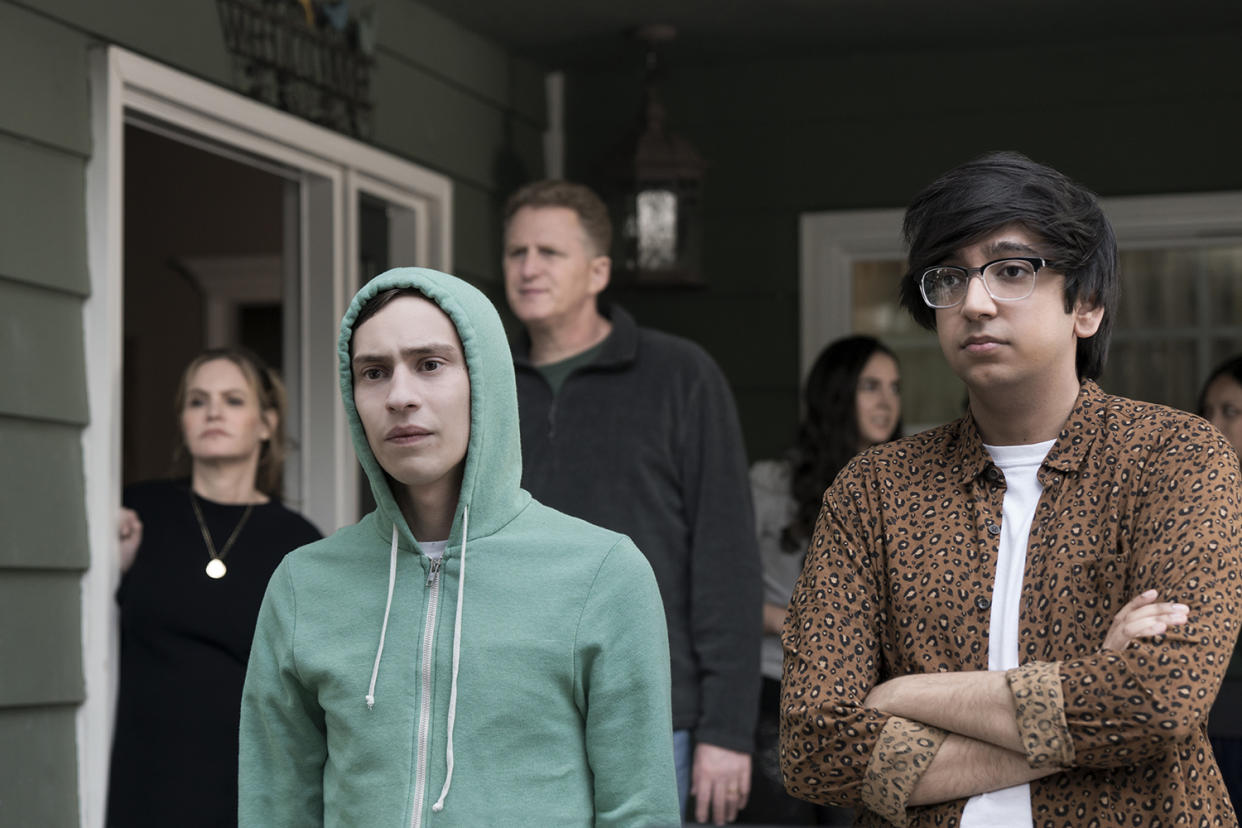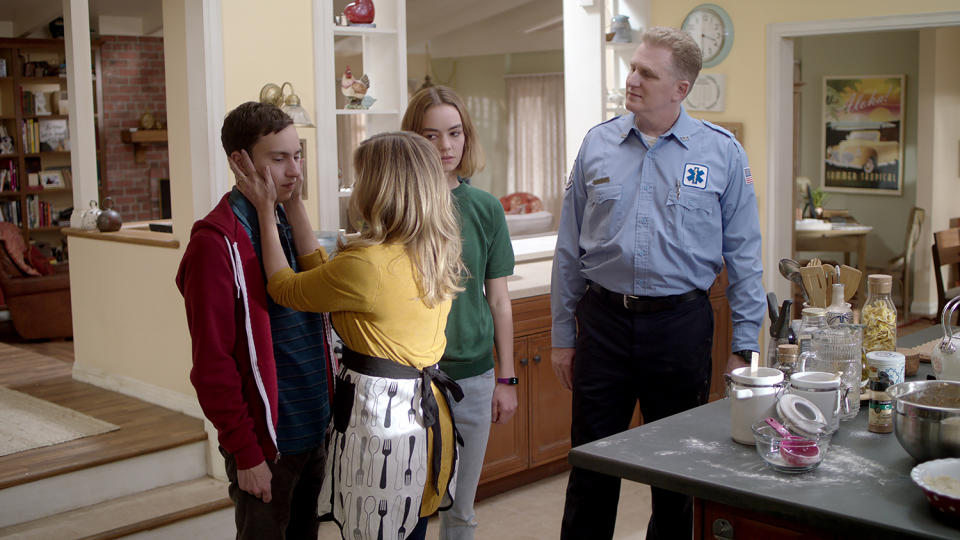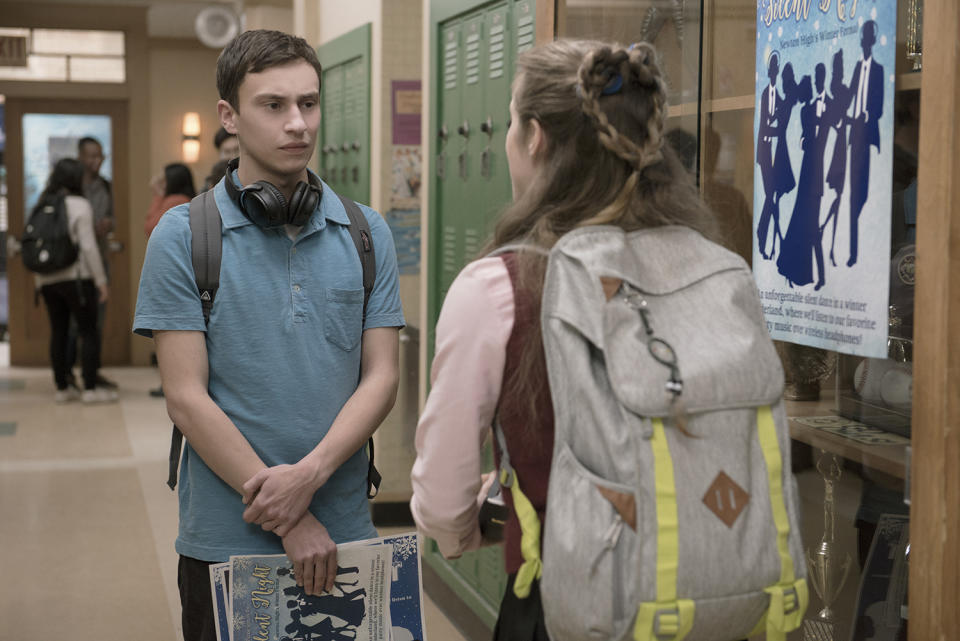'Atypical' star Keir Gilchrist on playing a kid with autism: 'This is just the story of a family'

In Netflix’s Atypical, his first series-regular role since he stole many a scene in United States of Tara, Keir Gilchrist plays Sam, a high schooler who’s struggling with all the issues of young adulthood — dating, family, friends, social life — with the added challenge of being autistic. Sam is high-functioning on the autism spectrum, and the show, unlike most series that tackle the topic, refreshingly mixes heart and humor as Sam wends his way through his first crush, his first girlfriend, therapy, an overprotective mom (played by Jennifer Jason Leigh), and a previously distant father who’s decided to make an extra effort to connect.
Gilchrist talked to Yahoo TV about the book that helped him really understand who Sam is, what attracted him to the role, and what he found to be the biggest challenge in portraying Sam honestly.
Yahoo TV: What attracted you to the role?
Keir Gilchrist: Well, initially, the script. I was sent the script, and I loved the original pilot script so much. It was really well thought through. [Series creator] Robia [Rashid] is so talented, and the role of Sam was so well written. I definitely wanted it more than anything I had auditioned for in a long time.
I loved Sam. It was a real challenge for me as an actor, more so than stuff I had done in the past. I usually don’t get all that … I guess committed, to a role when I’m auditioning, just so that I don’t get hurt. This was this weird one where I just had this feeling that I really wanted it more than anything else. I didn’t even want to talk about it. People would bring it up. “How’s it going with that?” I just kept saying I didn’t want to talk about it, because I didn’t want to jinx it or anything.
Did you prepare for this role differently than you do for most?
Yeah, yeah. In most roles, I’m playing a character who’s a lot more similar to who I am in real life, so I don’t need to do as much research, but Robia was really great about making sure that we together collaborated and got Sam right and figured out who Sam was and tried to really just nail the part as much as possible. Probably the best thing she gave me was this really great book called The Journal of Best Practices. It’s a really fantastic book about a man who learns that he is on the autism spectrum later in life, actually after he’s already married and has a few kids. It really takes you into the way he thinks, and is well written. That was probably the most helpful thing of all the research that we did.
What were you most concerned or anxious or just committed to getting right, playing a person with autism?
It was definitely a hurdle to get over. It was playing against a lot of what I usually do as an actor, even in terms of, Sam doesn’t make a lot of eye contact. Sam’s in his own world in a lot of the scenes. Not that he isn’t present, but it’s definitely an interesting way of doing scene work that I was not used to. … He’s very high-functioning. He’s not representative of all people on the spectrum. He’s one person.
Growing up, I’ve spent a lot of time around people on the spectrum — high-functioning, low-functioning. I had a lot of personal experience that I drew from. If we wanted to make a series about the autism spectrum, ideally we probably would have done a documentary series … but this is just a story of a family. I give Robia as much credit as possible for just really doing her research and knowing what she wanted for this.
This is a serious topic, an emotional topic, but there’s a lot of humor in the show too.
That’s definitely something that attracted me to the script as well. Like you were saying, I think that is more realistic. I don’t think someone on the autism spectrum is continuously surrounded by negativity and sadness. … There are days when hilarious things happen and then there are times when it’s really difficult. Yeah, the humor on the show to me is what maybe sets it apart from other stuff I’ve seen on the subject.

Did you do the incredible drawings in Sam’s notebook?
No, we had an artist do all of those. They’re really great, but I’m unfortunately not a great visual artist. When I was young, I mostly did digital art and then I fell off of it. Those notebooks are actually full, cover to cover. The props department killed it on the show.
What were some of the most fun scenes for you to play? The silent disco in the finale is fun to watch and is visually really cool.
Oh, yeah. That was really fun, just having all the extras and everybody with the headphones. They did an amazing job on the set. The only thing that wasn’t super-fun that night for me was that I had to be wet in a tuxedo the whole night, which is not comfortable. Other than that it was great because it was also one of the few days where we had everybody from the cast on set.

You’re also in a band, correct?
I play in a scream-metal band. A grindcore band. Just for fun, basically, but that’s my other passion; when I’m not acting, I do music. There was a night that we [filmed Atypical], and I left work and then went to a venue to play a show. I did a show last year where I actually had two days off and then flew home, flew right back, and started shooting again. I’m always doing both at the same time.
What’s the name of the band?
It’s called Whelm. It’s [a] very obscure kind of underground music. I don’t ever see more than a couple hundred people ever coming to a grindcore show, really, because it’s very, very loud and heavy. There’s no melodic parts really at all.
A band that Sam would definitely not be going to see.
Yeah. Sam would just [hate] my band, for sure. It would be a nightmare for him to come to our show.
Atypical premieres Aug. 11 on Netflix.
Read more from Yahoo TV:
? First look: ‘Seinfeld’ alum Wayne Knight says ‘hello’ to ‘The Young and the Restless’
? ‘South Park’ turns 20: 5 things you didn’t know about the first episode
? ‘The Walking Dead’: 10 memorable characters who became walkers

